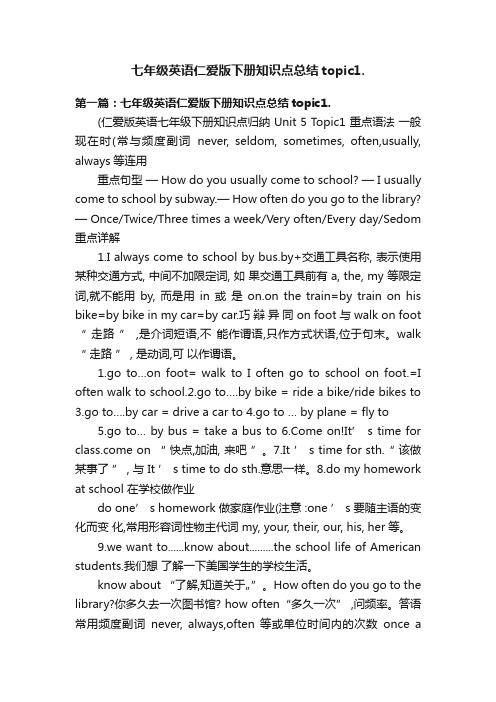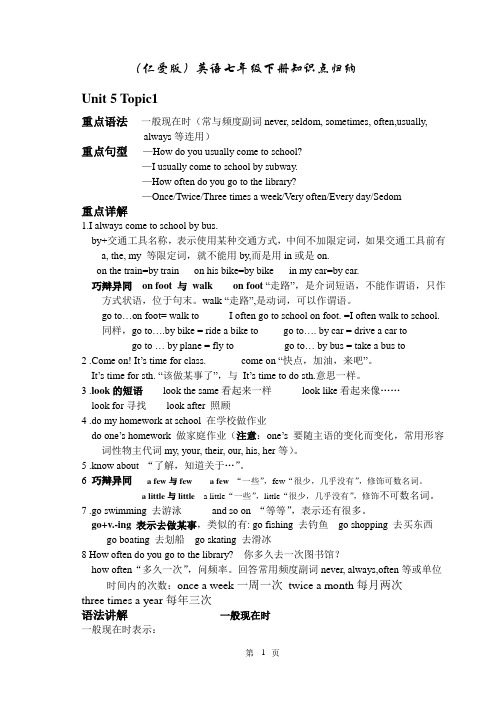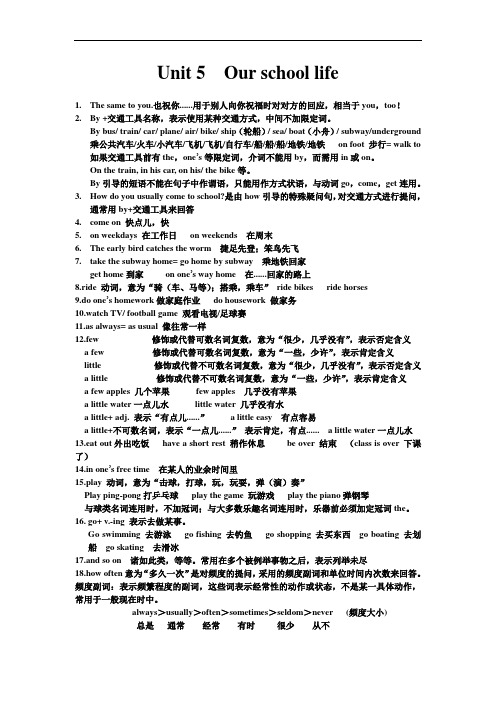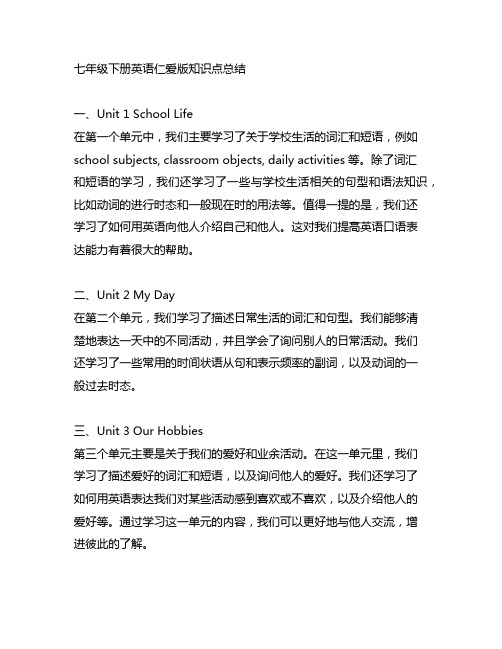仁爱英语七年级下册知识点详细归纳
(完整版)仁爱版英语七年级下全部知识点总结.doc

七年级下英语知识点总结Unit 5 Topic1㈠短语总结1.在学校大门口 at the school gate2.来学校come to school3. 去学校go to school4. 上课have class / have classes5. 步行on foot6.骑自行车ride a bike/ ride bikes/ by bike / on a bike7.坐公交by bus / take a bus8.坐地铁by subway / take the subway / on the subway9.坐飞机by plane/ take the plane / on the plane10.坐小汽车by car / in a car/ take a car/ drive a car11. 坐轮船by ship12. 坐小船by boat13. 坐火车by train / on the train14. 在我们组in our group15.一群学生a group of students16.我们中的三个人 three of us17.在平日 on weekdays18.在周末 on the weekends / at weekends19.起床 get up20.睡觉 go to bed21.早起 get up early22.回家 go home23.到家 get home24.去动物园 go to the zoo25.去公园 go to the park26.看电影 see a movie / film27.看电视 watch TV28.在晚上 in the evening / at night29.帮助父母 help parents30.做某人的家庭作业 do one’s ( my/ her/ his/ your/ their)homework31.在学校 at school32.知道 ,了解 know about / learn about33.校园生活 school life34.一个美国学生 an American student35.在美国 in America / in the U.S.A.36.许多学生 many students/ a lot of students/ lots of students37.很少 very few38.吃午饭 have lunch39.出去吃饭 eat out40.在校期 on school days41.休息一会 have a short rest/ break42.午后 after lunch43.在某人的余 in one’s ( my/ his/ her/ their⋯)free/ spare time44.打球 play basketball45.踢足球 play soccer / football46.琴 play the piano47.吉他 play the guitar48.拉二胡 play erhu49.去游泳 go swimming / go for a swim50.去划船 go boating51.球 a ball game / ball games52.一年四次 four times a year53.听音 listen to music54.read books55.看 read newspapers56.看医生 see a doctor57.去 go to the library58.一周两次 twice a week59.朋友 meet friends60.每天 every day61.在七点半 at half past seven62.一小会 for a little while / for a short time63.晚后 after supper64.吃 have dinner65.吃早 have breakfast㈡重要句型1.I usually come to school by subway.同句 : I usually take the subway to school.划部分提 : How do you usually come to school?似的有:go to school by bike=go to schoolon a bike= ride a bike to school=ride to schoolgo home by bus=go home on a bus=take a bus home2.How do you usually/ often⋯?你通常 /常怎⋯?3.It ’stime for class.=It’s time to have class. =It’s time for having class.4.What about you? =How about you?5.How often ⋯? 率,回答可以用率副: always, usually, often,sometimes, seldom, never, every day ,every +其他名或表示率的短回答表示率的短:次数 +位e.g. : once a day / twice a week / three times a month6.The early bird catches the work. ( ) 笨先7.Work / Study must come first. 工作 / 学必放在第一位!8. Classes begin at eight. =Class begins at eight.提问:What time does the class begin? / What time do the classes begin?㈢重要单词的用法1.look (感官动词 ) 看起来,后面加形容词His mother looks very young.They look very cute.Her dress looks very nice.You look very cool in this coat.2. by 介词by 后面直接加表示交通工具的名词,中间不用任何词修饰,如: by bike by +动词 ing 形式,表示通过某种方式People show love to their mothers by giving cards.You can be a good student by working hard.3.over (形容词 ) School/ Class is over.4.begin现在分词 : beginning 过去式 : beganbegin to do sth , begin doing sthHe begins to write a letter. =He begins writing a letter.如果 begin 本身为分词,只能用begin to do sthHe is beginning to run.5.listen to 听(动作), hear 听见 (结果 )6.always 反义词 never7.本话题涉及的时态为一般现在时,句中常有频率副词或表示频率的短语,如果主语为三单,动词一定要用三单!(四)易错题1.You new watch ______ (look) very nice!2.Here ______(be) some news.3.Oh, come on! It’s time_____ going to school.4.They usually go to school on ________(feet).5.In my class, forty of _______(we) go to school by bike.6.The early bird ______ (catch) the worm.7.Kangkang often _____ (ride) a bike to the park.8.What time _____ (be)school over?9.Work must come ______(once).10.It ’stime ____you to get up.11.We often _____ books in the morning.12.Jill ’s friend like ______(study) in our school.13.Mr. Wang teaches ______(we) English. _____ of us like him.14.How about ______(go) out with me?15.Most students go to school _____ the school bus.16._______ do you go shopping with your mother?A. How soonB. How farC. How oftenD. How much17. What time do you usually get up _____ weekdays?18. He ______ busy, so he has no time to play with us.A. is alwaysB. seldom isC. always isD. often is19.The last class______(finish) at twelve o’clock.20.Let’s go______(boat).21.It’stime to have breakfast. 同(义句 )______________________________________________________.22.Michael often rides a bike to school. 同(义句 )______________________________________________________.23.I always go to work on foot. (对划线部分提问 )______________________________________________________.24.My mother goes shopping twice a week. 对(划线部分提问 )______________________________________________________.25.Mary always reads books in the library. 反(义句 )______________________________________________________.26.He usually does his homework at school.否(定句 )______________________________________________________.27.They often go to school by bus in the morning. 对(划线部分提问 ) ______________________________________________________.28.Jane seldom watches TV on weekdays改.(为一般疑问句 )______________________________________________________.29.He usually has lunch at home. 对(划线部分提问 )______________________________________________________.30.Li Ping often goes to work on foot. (同义句 )______________________________________________________.31.几乎没有学生乘地铁去学校。
仁爱版七年级(下册)知识点要点总结

仁爱版七年级(下册)知识点要点总结本学期研究的知识点包括:
语文
- 形音义的关系
- 修辞手法的运用
- 古诗文的鉴赏
- 现代文阅读与写作
数学
- 相反数与绝对值
- 分数加减乘除
- 二次根式与平方根
- 整式的加减乘除
英语
- 现在进行时
- 祈使句
- 简单过去式
- 数词与日期
历史
- 秦汉和尚书制的改革- 西汉时期的政治和军事- 东汉时期的政治和文化- 三国时期的政治和文化
生物
- 细胞的基本结构和功能- 生物多样性的认识
- 植物的结构和生长
- 动物的体内环境和调节
地理
- 中国的地理位置和自然地理条件
- 中国的人口与经济
- 中国的交通和旅游
- 国际热点问题的认知
政治
- 报告的主要内容
- 中国特色社会主义的本质特征
- 社会主义核心价值观的内涵与精神实质
- 当前的国际形势和中国与世界的关系
以上是本学期主要的知识点汇总。
在学习各科知识的同时,要
注意拓展视野、强化思维训练,努力提高语言表达能力、计算能力、探究能力和综合应用能力。
七年级英语仁爱版下册知识点总结topic1.

七年级英语仁爱版下册知识点总结topic1.第一篇:七年级英语仁爱版下册知识点总结topic1.(仁爱版英语七年级下册知识点归纳 Unit 5 Topic1 重点语法一般现在时(常与频度副词never, seldom, sometimes, often,usually, always等连用重点句型— How do you usually come to school? — I usually come to school by subway.— How often do you go to the library? — Once/Twice/Three times a week/Very often/Every day/Sedom 重点详解1.I always come to school by bus.by+交通工具名称, 表示使用某种交通方式, 中间不加限定词, 如果交通工具前有 a, the, my 等限定词,就不能用by, 而是用in 或是on.on the train=by train on his bike=by bike in my car=by car.巧辩异同 on foot 与 walk on foot “ 走路” ,是介词短语,不能作谓语,只作方式状语,位于句末。
walk “ 走路” , 是动词,可以作谓语。
1.go to…on foot= walk to I often go to school on foot.=I often walk to s chool.2.go to….by bike = ride a bike/ride bikes to3.go to….by car = drive a car to4.go to … by plane = fly to5.go to… by bus = take a bus toe on!It’ s time for e on “ 快点,加油, 来吧”。
(完整版)(仁爱版)英语七年级下册知识点归纳

(仁爱版)英语七年级下册知识点归纳Unit 5 Topic1重点语法一般现在时(常与频度副词never, seldom, sometimes, often,usually, always等连用)重点句型—How do you usually come to school?—I usually come to school by subway.—How often do you go to the library?—Once/Twice/Three times a week/Very often/Every day/Sedom重点详解1.I always come to school by bus.by+交通工具名称,表示使用某种交通方式,中间不加限定词,如果交通工具前有a, the, my 等限定词,就不能用by,而是用in或是on.on the train=by train on his bike=by bike in my car=by car.巧辩异同on foot 与walk on foot “走路”,是介词短语,不能作谓语,只作方式状语,位于句末。
walk “走路”,是动词,可以作谓语。
go to…on foot= walk to I often go to school on foot. =I often walk to school.同样,go to….by bike = ride a bike to go to…. by car = drive a car to go to … by plane = fly to go to… by bus = take a bus to2 .Come on! It’s time for class. come on “快点,加油,来吧”。
It’s time for sth. “该做某事了”,与It’s time to do sth.意思一样。
3 .look的短语look the same看起来一样look like看起来像……look for寻找look after 照顾4 .do my homework at school 在学校做作业do one’s homework 做家庭作业(注意:one’s 要随主语的变化而变化,常用形容词性物主代词my, your, their, our, his, her等)。
(完整版)仁爱版七年级英语下册知识点总结

Unit 5 Our school life1.The same to you.也祝你......用于别人向你祝福时对对方的回应,相当于you,too!2.By +交通工具名称,表示使用某种交通方式,中间不加限定词。
By bus/ train/ car/ plane/ air/ bike/ ship(轮船)/ sea/ boat(小舟)/ subway/underground 乘公共汽车/火车/小汽车/飞机/飞机/自行车/船/船/船/地铁/地铁on foot 步行= walk to 如果交通工具前有the,one’s等限定词,介词不能用by,而需用in或on。
On the train, in his car, on his/ the bike等。
By引导的短语不能在句子中作谓语,只能用作方式状语,与动词go,come,get连用。
3.How do you usually come to school?是由how引导的特殊疑问句,对交通方式进行提问,通常用by+交通工具来回答e on 快点儿,快5.on weekdays 在工作日on weekends 在周末6.The early bird catches the worm 捷足先登;笨鸟先飞7.take the subway home= go home by subway 乘地铁回家get home到家on one’s way home 在......回家的路上8.ride 动词,意为“骑(车、马等);搭乘,乘车”ride bikes ride horses9.do one’s homework做家庭作业do housework 做家务10.watch TV/ football game 观看电视/足球赛11.as always= as usual 像往常一样12.few 修饰或代替可数名词复数,意为“很少,几乎没有”,表示否定含义a few 修饰或代替可数名词复数,意为“一些,少许”,表示肯定含义little 修饰或代替不可数名词复数,意为“很少,几乎没有”,表示否定含义a little 修饰或代替不可数名词复数,意为“一些,少许”,表示肯定含义a few apples 几个苹果few apples 几乎没有苹果a little water一点儿水little water 几乎没有水a little+ adj. 表示“有点儿......” a little easy 有点容易a little+不可数名词,表示“一点儿......”表示肯定,有点...... a little water一点儿水13.eat out外出吃饭have a short rest 稍作休息be over 结束(class is over 下课了)14.in one’s free time 在某人的业余时间里15.play 动词,意为“击球,打球,玩,玩耍,弹(演)奏”Play ping-pong打乒乓球play the game 玩游戏play the piano弹钢琴与球类名词连用时,不加冠词;与大多数乐趣名词连用时,乐器前必须加定冠词the。
仁爱版七年级下知识点

仁爱版七年级下知识点在学习七年级下学期教材《仁爱版》中,我们需要掌握以下知识点:一、语言知识1.词汇七年级下学期的词汇主要围绕日常生活、学校生活、家庭、交通出行等方面展开。
学生需要掌握一些基本词汇,如“早上”、“中午”、“晚上”、“作业”、“澡堂”、“客厅”、“公共汽车”、“地铁”等。
此外,也需要掌握一些常用词汇的用法,如“因为”、“所以”、“虽然”等。
2.语法七年级下学期的语法主要包括词汇构成、基本句型、动词的时态和语态等方面的内容。
需要注意的是,语法知识需要和实际运用相结合,才能更加深入地理解语法知识。
3.语音学生需要掌握标准的普通话发音,并且能够正确地读出单词和句子。
同时也需要掌握一些语音规则,如汉语拼音的读音规则,如同音字、同音词、多音字的处理等知识。
二、阅读策略1.理解主旨在阅读过程中,首要任务是理解文章的主旨,即从文章中概括出作者要表达的中心意思。
这需要学生们对文章的标题、题目、全文进行快速浏览,然后逐段理解,最后整体把握文章的脉络。
2.提取细节在理解文章的基础上,需要学生们提取文章重要的细节信息。
这需要学生们有很好的阅读技巧和细心的态度。
提取出来的细节信息可用于形成笔记或课堂讨论。
3.推论判断在提取细节的基础上,需要学生们进行一些推论和判断。
这就需要学生们用自己的语言归纳总结,用自己的判断来解释文章的含义。
三、写作技巧1.写作结构在写作过程中,学生们需要注重文章的结构和层次。
要让文章的结构清晰,层次分明,既不显得太过松散,也不会显得过于拘束。
2.语言表达学生们需要注意语言表达的清晰、准确和生动。
要做到用简明扼要、生动形象的语言表达思想。
3.写作素材写作素材是写作的基础。
为了写出优秀的作品,学生们需要搜集信息、积累素材。
可以用书籍、网站、报纸等多种途径来收集写作素材。
综上所述,七年级下学期的《仁爱版》教材知识点主要包括语言知识、阅读策略和写作技巧等方面,在学习过程中,学生们需要注重知识点的理解和实际运用,不断锤炼自己的语言表达能力,提高自己的思维能力和综合素质。
(完整)仁爱版英语七年级下全部知识点总结,推荐文档

七年级下英语知识点总结Unit 5 Topic1㈠短语总结1.在学校大门口at the school gate2.来学校come to school3.去学校go to school4.上课have class / have classes5.步行on foot6.骑自行车ride a bike/ ride bikes/ by bike / ona bike7.坐公交by bus / take a bus8.坐地铁by subway / take the subway / onthe subway9.坐飞机by plane/ take the plane / on theplane10.坐小汽车by car / in a car/ take a car/ drive acar11.坐轮船by ship12.坐小船by boat13.坐火车by train / on the train14.在我们组in our group15.一群学生 a group of students16.我们中的三个人three of us17.在平日on weekdays18.在周末on the weekends / at weekends19.起床get up20.睡觉go to bed21.早起get up early22.回家go home23.到家get home24.去动物园go to the zoo25.去公园go to the park26.看电影see a movie / film27.看电视watch TV28.在晚上in the evening / at night29.帮助父母help parents30.做某人的家庭作业do one’s ( my/ her/ his/your/ their)homework31.在学校at school㈡重要句型1. I usually come to school by subway.同义句: I usually take the subway to school.对划线部分提问: How do you usually come to school? 32.知道,了解know about / learn about33.校园生活school life34.一个美国学生an American student35.在美国in America / in the U.S.A.36.许多学生many students/ a lot of students/ lotsof students37.很少very few38.吃午饭have lunch39.出去吃饭eat out40.在校期间on school days41.休息一会have a short rest/ break42.午饭后after lunch43.在某人的业余时间in one’s( my/ his/ her/their…)free/ spare time44.打篮球play basketball45.踢足球play soccer / football46.弹钢琴play the piano47.弹吉他play the guitar48.拉二胡play erhu49.去游泳go swimming / go for a swim50.去划船go boating51.球赛a ball game / ball games52.一年四次four times a year53.听音乐listen to music54.读书read books55.看报read newspapers56.看医生see a doctor57.去图书馆go to the library58.一周两次twice a week59.见朋友meet friends60.每天every day61.在七点半at half past seven62.一小会for a little while / for a short time63.晚饭后after supper64.吃饭have dinner65.吃早饭have breakfastgo to school by bike=go to schoolon a bike= ride a bike to school=ride to schoolgo home by bus=go home on a bus=take a bus home2.How do you usually/ often…?你通常/经常怎样…?3.It’s time for class.=It’s time to have class. =It’stime for having class.4.What about you? =How about you?5.How often …?询问频率,回答可以用频率副词:always, usually, often, sometimes, seldom, never, every day ,every +其他时间名词或表示频率的短语回答表示频率的短语:次数+单位时间e.g. : once a day / twice a week / three times a month6.The early bird catches the work. (谚语) 笨鸟先飞7.Work / Study must come first. 工作/ 学习必须放在第一位!8.Classes begin at eight. =Class begins at eight.提问:What time does the class begin? / What time do the classes begin?㈢重要单词的用法1. look (感官动词) 看起来,后面加形容词His mother looks very young.They look very cute.Her dress looks very nice.You look very cool in this coat.1.You new watch (look) very nice!2.Here (be) some news.3.Oh, come on! It’s time going to school.4.They usually go to school on (feet).5.In my class, forty of (we) go to schoolby bike. 2.by 介词by 后面直接加表示交通工具的名词,中间不用任何词修饰,如:by bikeby +动词ing 形式,表示通过某种方式People show love to their mothers by giving cards.You can be a good student by working hard. 3.over ( 形容词)School / Class is over.4.begin现在分词: beginning 过去式: beganbegin to do sth , begin doing sthHe begins to write a letter. =He begins writing a letter.如果begin 本身为分词,只能用begin to do sthHe is beginning to run.5.listen to 听(动作),hear 听见(结果)6.always 反义词never7.本话题涉及的时态为一般现在时,句中常有频率副词或表示频率的短语,如果主语为三单,动词一定要用三单!(四)易错题us.A. is alwaysB. seldom isC. always isD. often is19.The last class (finish) at twelve o’clock.20.Let’s go (boat).21.It’s time to have breakfast. (同义句)6.The early bird (catch) the worm.7.Kangkang often (ride) a bike to the park. .8.What time (be)school over? 22. Michael often rides a bike to school. (同义句)9.Work must come (once).10.It’s time you to get up.11.We often books in the morning..23. I always go to work on foot. (对划线部分提问)12.Jill’s friend like (study) in our school.13.Mr. Wang teaches (we) English. .of us like him.14.How about (go) out with me? 24.My mother goes shopping twice a week. ( 对划线部分提问)15.Most students go to school the school bus.16.do you go shopping with your mother?A. How soonB. How farC. How oftenD. How much.25.Mary always reads books in the library. (反义句)17.What time do you usually get up .weekdays?18.He busy, so he has no time to play with 26.He usually does his homework at school. (否定句).27.They often go to school by bus in the morning.(对划线部分提问)(一) 重要单词:Unit5 Topic2.28.Jane seldom watches TV on weekdays. (改为一般疑问句).29.He usually has lunch at home. (对划线部分提问).30.Li Ping often goes to work on foot. (同义句).31.几乎没有学生乘地铁去学校。
七年级下册英语仁爱版知识点总结

七年级下册英语仁爱版知识点总结一、Unit 1 School Life在第一个单元中,我们主要学习了关于学校生活的词汇和短语,例如school subjects, classroom objects, daily activities等。
除了词汇和短语的学习,我们还学习了一些与学校生活相关的句型和语法知识,比如动词的进行时态和一般现在时的用法等。
值得一提的是,我们还学习了如何用英语向他人介绍自己和他人。
这对我们提高英语口语表达能力有着很大的帮助。
二、Unit 2 My Day在第二个单元,我们学习了描述日常生活的词汇和句型。
我们能够清楚地表达一天中的不同活动,并且学会了询问别人的日常活动。
我们还学习了一些常用的时间状语从句和表示频率的副词,以及动词的一般过去时态。
三、Unit 3 Our Hobbies第三个单元主要是关于我们的爱好和业余活动。
在这一单元里,我们学习了描述爱好的词汇和短语,以及询问他人的爱好。
我们还学习了如何用英语表达我们对某些活动感到喜欢或不喜欢,以及介绍他人的爱好等。
通过学习这一单元的内容,我们可以更好地与他人交流,增进彼此的了解。
四、Unit 4 Celebrations第四个单元主要是关于庆祝活动。
我们学习了描述不同庆祝活动的词汇和短语,以及询问别人关于庆祝活动的相关问题。
我们还学习了一些关于时间的表达方式,比如日期、星期、月份等。
我们还学习了一些关于情感的形容词,以及表示祝福的句型和短语。
五、Unit 5 The World Around Us在第五个单元中,我们学习了描述环境和自然现象的词汇和短语,以及相关的句型和语法知识。
我们可以用英语描述不同的自然现象,比如天气、季节等,也能够表达对自然环境的关心和热爱。
除了这些,我们还学习了一些关于地点和方位的词汇,以及表示允许和禁止的句型和短语。
六、Unit 6 Amazing Stories在第六个单元中,我们学习了一些关于神话故事和传奇人物的词汇和短语。
- 1、下载文档前请自行甄别文档内容的完整性,平台不提供额外的编辑、内容补充、找答案等附加服务。
- 2、"仅部分预览"的文档,不可在线预览部分如存在完整性等问题,可反馈申请退款(可完整预览的文档不适用该条件!)。
- 3、如文档侵犯您的权益,请联系客服反馈,我们会尽快为您处理(人工客服工作时间:9:00-18:30)。
仁爱英语七年级下册知识点详细归纳Unit 5 Our School LifeTopic1 How do you go to school?一、重点词语:1. wake up 醒来,唤醒get up 起床2. go to school 去上学go home 回家3. go dancing / shopping / skating / swimming 去跳舞;购物、滑冰;游泳go doing something 可用于表达去进行某种娱乐休闲活动。
4. 表示交通方式:on foot 步行by boat 坐船by ship 坐船by air 乘飞机by plane 乘飞机by train 坐火车by subway搭乘地铁by car 坐小汽车by bus坐公共汽车by bike 骑自行车5. take the subway / bus / car 搭乘地铁;公共汽车;小汽车6. drive a car to work = go to work by car 驾车去上班take a bus to work = go to work by bus 乘公共汽车去上班go to school on foot = walk to school 步行去上学7. ride a bike / horse 骑自行车;骑马8. after school / class 放学以后;下课以后9. play the piano / guitar / violin 弹钢琴;吉他;小提琴play basketball / soccer / football 打篮球;踢足球;打橄榄球play computer games 玩电脑游戏play with a computer 玩电脑play sports 做运动10. next to 紧挨着,在…旁边11. on weekdays 在工作日at weekends 在周末12. have breakfast / lunch / supper / dinner / meals 吃早餐;中餐;晚餐;正餐;一日三餐have classes / lessons / a meeting 上课;上课;开会13. watch TV / movies / games / the animals 看电视;电影;比赛;动物read novels / newspapers / books 看小说;报纸;书14. wash one’s face / clothes 洗脸;衣服15. 反义词:up – down, early – late 近义词:quickly – fastget up early 早起be late for 迟到16 表示建筑物(尤其学校建筑物):on the playground 在操场at school / home / table 学校;家里;桌旁in a computer room / teachers’ office / classroom building / gym / library / lab / canteen在电脑室;教师办公室;教学楼;体操馆;图书馆;实验室;食堂17. around six o’clock = at about six o’clock 大约在六点18. 频率副词:never, seldom, sometimes, often, usually, always二、重点句型:1. It’s time to get up. 该起床的时候了。
It’s time for breakfast. = It’s time to have breakfast = It’s time for having breakfast.该吃早饭了2. You must go to school early. 你必须早点去上学。
(主观因素造成“必须”)I have to wash my face quickly. 我不得不迅速地洗脸。
(客观因素造成“必须”)3. Happy New Year! The same to you! 新年快乐!也祝你新年快乐!4. How about you? = What about you? 你怎么样?5. How do you usually go to school? I usually go to school by bike.你通常怎样去上学?我通常骑自行车去上学。
What do you usually do after school? I usually play computer games.你通常放学做什么?我通常玩电脑游戏。
6. How does she usually go to work? She usually goes to work by car.她通常怎样去上班?她通常开车去上班。
What does he usually do after class? He usually reads novels.他通常下课后做什么?他通常看小说。
7. The early bird catches the worm! 早起的鸟儿有虫吃。
/ 笨鸟先飞。
三、语法学习:复习一般现在时和现在进行时。
一般现在时:1. 区别含有be动词和行为动词的肯定句式。
I am at home.√I stay at home.√I am stay at home. ×She stay at home. ×2. 一般疑问句、否定句表达的不同方式:Are you at home? Do you stay at home? Does she stay at home?Yes, I am. No, I am not. Yes, I do. No, I don’t. Yes, she does. No, she doesn’t.I am not at home. I don’t stay at home. She doesn’t stay at home.3. 主语为第三人称单数时,谓语行为动词的变化。
She plays computer games on Sundays.She studies English every morning.She goes to school on weekdays.She has breakfast at 6:45.4. 用法:(1) 表示现在的状况:I am a teacher. You are student. They are in London.(2) 表示经常的或习惯性的动作:I usually go to school on foot. She plays tennis every morning.(3) 表示主语具备的性格和能力等:He likes playing basketball. They do the cooking.现在进行时:1. 基本句式结构:I am play ing with a computer.2. 现在分词构成法:go – going play – playing have – having drive – drivingrun – running swim – swimming begin – beginning3. 用法:(1)表示现在正在进行的动作:She is having dinner. 她正在用餐。
(2)方位动词的现在进行时可用来表示将要发生的动作:I’m going. 我要走了。
Topic 2 How often do you have an English class?一、重点词语:3. swimming pool 游泳池4. listen to music 听音乐write letters 写信go roller-skating 滑滑轮go shopping 去购物have an English class 上英语课go to the park 去公园meet friends 会见朋友draw pictures 画画play sports 做运动watch TV 看电视play computer games 玩电脑游戏play soccer 踢足球work on math problems 解答数学题take exercises 做运动learn about the past 学习历史learn how to read and write in Chinese 学着用中文读写play ball games with my classmates 和我的同班同学玩球类游戏5. be good at = do well in 擅长于…I am good at English. = I do well in English.6. be different from 与…不同the same as 与…相同7. do outdoor activities 进行户外活动8. every week 每周each day=every day 每天three times a week 每周三次9. do one’s best 尽力去做某事do one’s homework 做家作10. like doing something = love doing something 喜欢做某事hate doing something 讨厌做某事11. at half past six = at thirty past six = at six thirty六点半at seven o’clock = at seven 在七点at five fifteen = at fifteen past five = at a quarter past five五点十五分at fifteen to ten = at a quarter to ten = at nine forty-five 九点四十五分12. for a little while 就一会儿13. a student of Grade One 一年级的学生14. eat out 出去吃,下馆子15. get home 到家二、重点句型:1. Which place do you like best? I like the computer room best.你最喜欢哪个地方?我最喜欢电脑室。
2. Swimming is my favorite sport. = I like swimming best. 游泳是我最喜欢的运动。
3. Why do you think so? Because he likes sleeping. 你为什么这么想?因为他喜欢睡觉。
